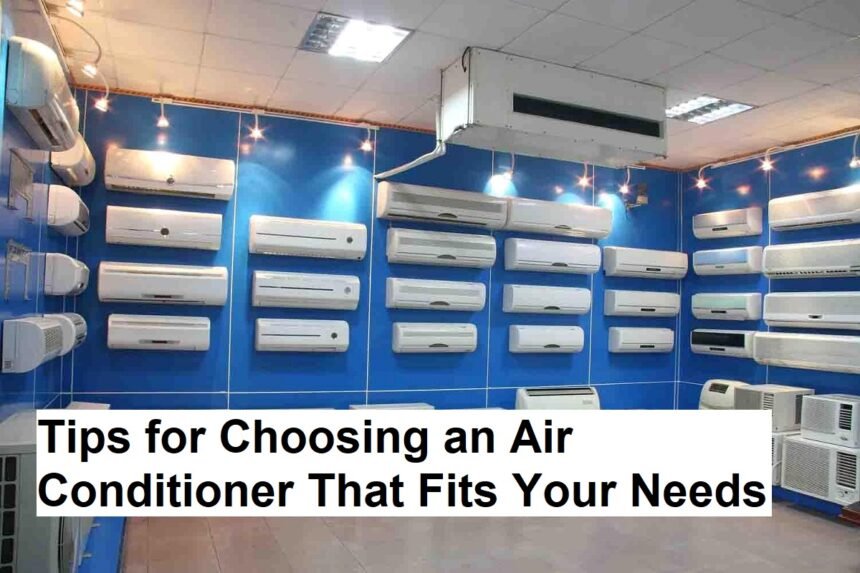Introducing
Selecting the right air conditioner (AC) is crucial for maintaining a comfortable, energy-efficient, and cost-effective home or office environment. With numerous types, sizes, and features available, making an informed decision can be overwhelming. Whether you’re upgrading your existing system or installing a new one, understanding your specific needs and evaluating various factors will help you choose an AC that’s perfect for your space. Here are essential tips to guide you in making the best choice.
1. Assess Your Cooling Needs
The first step in choosing the right AC is understanding your cooling requirements. Consider the size of the room, insulation, window size, and sunlight exposure.
Key factors:
- Room size: Larger rooms require higher capacity units (measured in BTUs or tons). As a general guideline:
-
- 1,000-1,200 sq ft: 12,000-18,000 BTUs
- 300-500 sq ft: 7,000-9,000 BTUs
- Insulation quality: Well-insulated rooms retain cool air better, reducing the cooling load.
- Sunlight: Rooms with lots of windows or direct sunlight tend to be warmer, requiring a more powerful AC.
- Number of occupants: More people generate heat, increasing cooling needs.
Accurately estimating your needs prevents over- or under-sizing, which can affect efficiency and comfort.
2. Choose the Right Type of Air Conditioner
There are various types of air conditioners suited for different situations:
- Window Units: Suitable for small rooms or single spaces, easy to install, and cost-effective.
- Split-Mini Split System: Ideal for cooling multiple rooms or larger spaces with individual control.
- Central Air Conditioning: Best for whole-house cooling, connected to ductwork, and effective for large homes.
- Portable ACs: Flexible options for temporary or supplemental cooling; easy to move but less efficient.
- Ductless Mini-Splits: Energy-efficient, quiet, and suitable for retrofitting older homes without ductwork.
Consider the size of your space, existing infrastructure, and your budget when selecting the appropriate type.
3. Check the Cooling Capacity (BTUs)
BTUs (British Thermal Units) measure an air conditioner’s cooling power. Selecting a unit with appropriate BTUs is vital for efficiency and comfort.
Tips:
- Too powerful: The unit cycles on and off frequently, wasting energy and not effectively dehumidifying.
- Too weak: The unit runs continuously but cannot cool the space adequately.
Consult with professionals or use online calculators to determine the ideal BTU rating based on your room size and other factors.
4. Focus on Energy Efficiency
An energy-efficient AC unit saves you money on electricity bills and reduces environmental impact. Look for units with high Energy Efficiency Ratio (EER) or Seasonal Energy Efficiency Ratio (SEER) ratings.
What to consider:
- Inverter technology: Adjusts compressor speed, leading to significant energy savings.
- Energy Star certification: Indicates compliance with energy-saving standards.
- Twin-rotary compressors: Offer better efficiency and durability.
Although efficient units might have higher upfront costs, they pay off in long-term savings.
5. Consider Additional Features
Modern air conditioners come with various features that can enhance your comfort and convenience:
- Smart controls: Remote operation via smartphone apps or voice commands.
- Air purifiers and HEPA filters: Improve indoor air quality.
- Dehumidification mode: Reduces humidity to increase comfort.
- Timers and programmable settings: Allow scheduled operation to save energy.
- Noise level: Choose units with low decibel ratings for quiet operation.
Prioritize features that align with your lifestyle and specific needs.
6. Budget and Maintenance Costs
Set a realistic budget considering both initial purchase and ongoing costs. Cheaper units may save money upfront but could incur higher energy bills or require more frequent repairs.
Maintenance considerations:
- Regular filter cleaning or replacement.
- Annual professional servicing.
- Refrigerant top-ups or repairs (if needed).
Investing in a reliable, durable AC with manageable maintenance costs ensures long-term satisfaction.
7. Professional Installation
Proper installation is pivotal for optimal performance. Incorrect installation can lead to energy loss, higher bills, and system failure.
Tips:
- Hire certified and experienced technicians.
- Ensure adequate ventilation and correct insulation.
- Confirm that the unit is properly sized and positioned.
Professionally installed systems tend to operate more efficiently and last longer.
Final Thoughts
Choosing the right air conditioner doesn’t have to be complicated. By assessing your needs carefully, understanding the different types and features, and considering your budget, you can find an AC that provides maximum comfort with optimal efficiency. Remember, investing time in researching and consulting professionals will pay off by ensuring you get a system tailored to your space and lifestyle.
Stay informed, compare options, and prioritize quality and efficiency. With the right choice, you’ll enjoy a cool, comfortable environment all year round without unnecessary expenses or energy wastage.












